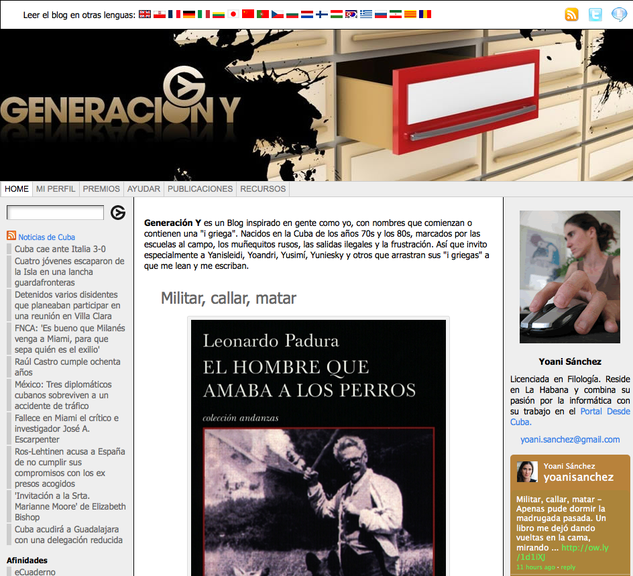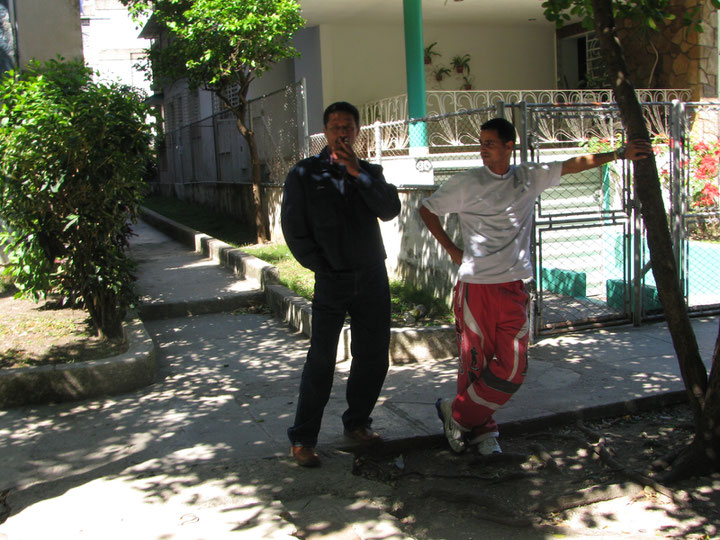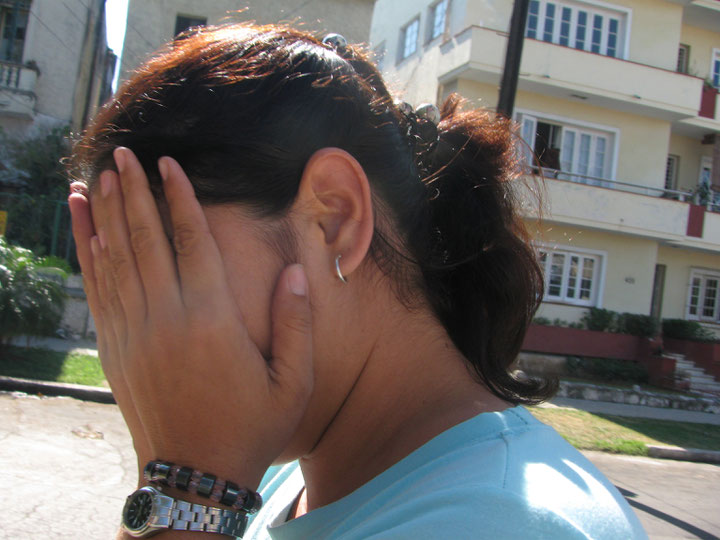Yoani Sánchez is a beacon of freedom who radiates a light of courage and hope from a Caribbean island affected by chronic information darkness and an atrophy of individual freedoms. She could have chosen to enjoy the tranquility of life in Europe but instead returned to her country on a mission. In 2004, two years after settling down in Switzerland, she decided to move counter-currently back to Cuba, as if she had been stricken by an irresistible inspiration or calling. She decided that she would return, but with a personal mission: to live as a free person in her homeland and contribute to the transformations that emerged inevitably on the Cuban horizon. To live free in one’s homeland sounds like a simple goal, but not in revolutionary Cuba, where an outdated and dysfunctional Marxist-Leninist regime is still based on a police state notorious for its disrespect of the Universal Declaration of Human Rights, including the celebrated Article 19:
Everyone has the right to freedom of opinion and expression; this right includes freedom to hold opinions without interference and to seek, receive and impart information and ideas through any media and regardless of frontiers.
When she arrived at Havana airport in 2004 and started facing the pressure to explain why she stayed so long in Europe, Yoani Sánchez could not imagine that her simple and personal mission would eventually project her around the world as a Freedom of Expression hero, an incarnation of the international struggle to defend Article 19. A philologist who graduated from Havana University, Yoani soon discovered journalism as a way to express herself and her incipient mission of living her life as a free person in Cuba, despite all the odds. Her journalistic career started shortly thereafter. In December 2004, she defied the restrictive political system in her country by launching the magazine »Consenso.« The alternative publication, described as »a space for reflection and debate,« invited participation from readers and promised to cover all aspects of Cuban life, from politics to spirituality.
Journalism was not just an accident in Yoani’s life or a simple tactical decision to pursue her personal mission of living as a free person in her own country. Journalism was a passion of her teenage years, especially when she was preparing for tests to enter university. It was not possible to study journalism then and she ended up in literature and philology. But since the beginning of »Consenso« in 2004, Yoani Sánchez has gradually emerged as the most famous Cuban journalist. Perhaps she is not famous in her own country because of the efficiency of Cuban censorship. But Yoani is admired among the large contingent of Cubans in exile and millions of people who know her work. More than a million people are said to follow her blog, which is translated by volunteers from around the world into more than 20 languages. And millions have heard or read about Yoani’s brave work to escape censorship and chronicle real life in Cuba.
Not only has Yoani been recognized as an award-winning journalist, but also as a new kind of journalist. She usually defines herself modestly by saying, »I am simply a citizen journalist, a person who writes her impressions on the Internet.« Of course she is much more than that. She represents a new generation of global citizens who use digital technologies to report on closed societies that otherwise would not be covered by regular media, and to advocate for social justice and freedom. In her case, after the experience with »Consenso,« Yoani launched the blog »Generation Y« in April 2007. The title is meant to be an invitation to the generation of Cubans born in the 1970s, as was Yoani, who have names starting with a Y, a strange thing when compared with Cuban traditions, but a reflection of the influence of the Soviet Union in those days.
»Generation Y« was a pioneer, launching a new style of Cuban dissident blogs. Instead of offering harsh political rhetoric against the communist regime, it mixes journalism, literature and often poetry to describe day-to-day life on the island. It does not miss any opportunity to criticize the regime and advocate for freedom and democracy, but it remains different from the traditional anti-Castro discourse that prevailed for decades, supported by the exile community in the United States. In fact, Yoani’s blog has also been critical of the United States and condemns Washington’s embargo that has tried to suffocate Cuba for so long. As »Generation Y« was gathering an audience among the small, privileged group of Cubans allowed to access the Internet on the island, government censorship intervened. The blog was blocked in Cuba in 2008, but fortunately communist censors don’t control the Internet beyond the island, and her audience grew exponentially overseas. Yoani Sánchez began to not only attract readers, but also legions of fans and volunteers from around the world, representing a great variety of languages and cultures, who wanted to help.
In the last year, the blog was not enough. Yoani found in Twitter, the micro-blogging service, another way to spread her journalistic work in an even faster, more agile and efficient way. It was amazing how she adapted to it, mixing her literary style with a speedy narration of ongoing relevant events that no one else would have covered. Through Yoani’s tweets we learn that police are repressing a demonstration at this moment, for example. It was through Yoani that we learned in 2009 that she and her husband were attacked in separate incidents just two weeks apart. Although Reinaldo Escobar (also a blogger) and Yoani were OK, she suffered light injuries courtesy of men who looked like government security agents. She shared with thousands of followers her excitement to discover how easy it was to tweet from her mobile phone, quite different from the times when she had to disguise herself as a tourist to use the Internet in hotels where Cubans citizens are not allowed.
Similar to the generosity she receives from abroad, Yoani Sánchez has graciously been involved in an effort to teach basic computer skills to fellow Cubans, in an improvised school of blogging. Despite the government restrictions and retaliations (she has been denied permission several times to travel abroad, for example), Yoani Sánchez continues to accomplish the mission she established for herself upon her return from Europe in 2004: to live in her homeland as a free person. That mission turned her into a true hero of Freedom of Expression, a great journalist, a pioneer of the use of digital media to circumvent censorship, and a well-deserved winner of the 2010 Prince Claus Award.
Most recently, Yoani Sánchez has been represented, as part of this year’s PhotoEspaña, in the exhibition »Face Contact«, a journey through the works of 31 artists who deal with the portrait as an element of identification and communication. Her work was set on two computers where visitors could see the postings of her blog together with the pictures she and her boyfriend took.
http://www.desdecuba.com/generaciony/?p=2493
http://www.phe.es/


